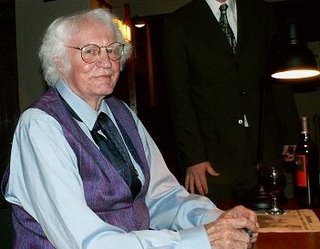Iron John and the Ennui Cartel

Apparently, the University of Minnesota intends to give author Robert Bly three-quarters of a million dollars for his “archives”. Let me break this down for you people: that’s ten respectable yearly salaries, a hundred generous grants, or a thousand not-too-shabby story prizes—all for the same price as the contents of one overrated windbag’s supply closet. Nice work, academic lit types. Way to be responsible stewards of the public interest.
But perhaps it’s wrong to speak of any sort of “interest” when discussing the United States writing scene. Because, while the stories and poems and novels they produce are many things, “interesting” is definitely not one of them. We are living in an era where to be a “living giant” of this nation’s literature means that, nine times out of ten, you are a complete waste of everyone’s time: dull and pretentious, arrogant and sentimental, comfortable and dismal.
The literature and creative writing departments of our universities deserve a lot of the blame for this. For decades now, they’ve lavished praise and professorships on authors who dress up tedium with tortured syntax and mystical posturing, the sort who—like Bly—promulge the stereotype that contemporary literature is a pursuit suited only for pseudo-intellectuals in silly vests who go into raptures at the prospect of yet another eight page description of a snowy day.
Bookish types like to fret about how no one reads anymore. What they usually mean is that nobody reads “serious” writing. The problem, however, is that so much “serious” writing is actually little more than drippy kitsch. The preferred “voice” is warbly and self-important, the pace is slower than a quaaluded gopher crawling through glue, and if there are plots at all they’ve probably already been done a hundred thousand times before. In many respects, Bly neither exceeds or falls shy of this low standard. His early poetry is competent, his political work was commendable (even if undertaken in that self-righteous wannabe-shaman mode so popular with artists who have heard themselves called “great” too many times), and the works he chooses to translate suggest wide-ranging interests.
It is mainly his non-fiction philosopolemical mumbo-jumbo that reveals him as one of our premier unintentional comedians masquerading as a legitimate artist. A brief sampling from his ridiculous best seller “Iron John” will suffice to illustrate what I’m talking about:
Sometimes in a love affair, the lovers make love with the Wild Man—and Wild Woman—right in the room; and if we are those lovers, we may feel certain body cells turn gold that we thought were made entirely of lead. Lovers and saints feel their fingertips are golden, all right; they may sense in themselves a freedom from ordinary limits for days or months.
An artist feels a curious mood of intensity when he or she is working on an art object, a poem or a painting or a sculpture; we could say that the sacred pond is right there in the studio; and the artist becomes capable of thoughts and feelings much wilder than he or she ever experiences in shut down days. The fingers holding the pen or brush turn gold, and we suddenly see amazing images, and realize what we are really good at.
The Wild Man here amounts to an invisible presence, the companionship of the ancestors and the great artists among the dead. A love poem or an ecstatic meditation poem is really an ingenious way to preserve memory of the moment when the fingertip turns gold.
If you want to read page after page of this stuff, Bly’s your guy. The ponderous mixing of bunkum with the banal, the weak observations dressed up as philosophy, and the endless, earnest attempts to render common knowledge as sacred secrets—that’s the Wild Man’s main modus operandi right there.
One of the common tics of today’s literature is to take some weak shit off the top of your head and try and sell it as a “quirky” observation. Gullible and swoony readers think that this sort of thing demonstrates that their cherished author exists on a higher imaginative plane, but it’s really just the flouncy hand gestures of amateur magicians attempting to hypnotize a nursing home. As befits his reputation, Bly can show all the pikers how this presto change-o routine is really done:
Grandiose ascenders sometimes dream of rising in an elevator that is attached to the outside of a building, but when they get to an upper floor, they often find themselves with no entrance to the building. The flying man usually likes women, but may shrink a woman to keep her in a bottle so that he can carry her in his pocket. The young peur aeternus men are by no means negative, they love spirit and embody much of the spiritual energy in the nation. Their ascensions bring many blessings to the culture. Without them, the American culture would probably thicken and harden into concrete. So the grandiose ascender is a complicated person.
Whatever.
This is the author who Jim Lenfesty calls, “the greatest living international [literary] asset in the United States”, the guy who the University library spokesman believes “really is one of the greatest writers alive”. I’m sorry, but that’s just fucking sad. They blew $775,000 on a bunch of detritus from a writer no one will remember in thirty years; a writer who might inspire these doughty Wild Men of the faculty lounge, but only inspires bored giggles from anyone with any taste.
P.S.: If you want to read about a real great American artist, why don’t you go on over here and find out what Sonny Rollins is up to these days. Because, frankly, there is more beauty, wildness and truth in ten bars of Sonny Rollins’ saxophone than there is in a million pages of Robert Bly doggerel.

